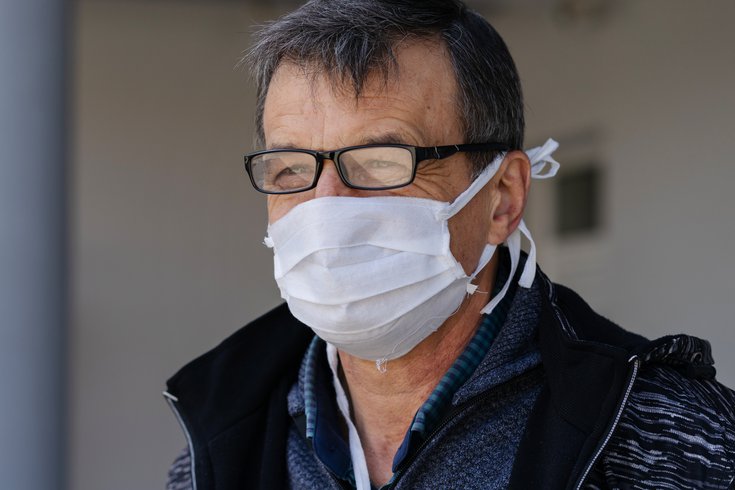
January 01, 2021
 Source/Image licensed from Ingram Image
Source/Image licensed from Ingram Image
Many Americans donned face masks consistently during 2020, hoping to prevent COVID-19. It shows that, when motivated, Americans can adopt habits that improve their health.
There is much in life out of our control, but when it comes to the most important dimension, our health, we have more power than we realize. The problem is too many Americans, particularly men over age 50, abdicate this power and fall victim to an unhealthy lifestyle. As we enter 2021, the experience of this past year may actually hold some promise through the lessons learned about our personal behavior.
Never in our lives has the health impact of our own behavior been so visible as in 2020. Experts have known for years that individual behavior tops all other factors, such as genetics, social circumstance or access to health care, when it comes to determinants of health. But 2020 took us to a more granular and highly visible level where hand washing, social distancing and mask wearing were the recommended behaviors. This link between personal behavior and health outcomes became horrifically apparent as COVID-19 cases, like clockwork, spiked after holidays punctuated by non-compliance.
The lesson of 2020, of course, is that there are health consequences, good and bad, to our behavior. In a non-COVID environment, the consequences of ignoring one’s health are often deferred for years as heart disease or other conditions may not manifest themselves until later in life. It explains why there is little outcry when today, the percentage of Americans classified as overweight or obese tops 70%. Or little attention is given to the fact that barely 3% of Americans lead a healthy lifestyle.
As far back as 2014, the Centers for Disease Control and Prevention reported that nearly 900,000 Americans die prematurely from the five leading causes of death each year – yet 20% to 40% of the deaths from each cause can be prevented. The agency concluded that many of the health risks behind these deaths are avoidable by making changes in personal behaviors. Despite the magnitude of these statistics, and how they compare with the 330,000-plus COVID-19 deaths in 2020, the immediacy and social inconvenience of COVID generates much more attention.
So, if COVID has made the case for the connection between behavior and health outcomes, then what have the events of 2020 told us about our ability to change? Are Americans capable of adopting healthy practices? Do we need encouragement? Perhaps regulation? The answer is best illustrated by the behavior that has come to define America’s adoption of new practices — face masks.
When it comes to mask wearing, Americans seem to have been willing to adopt new practices, or are at least be compliant with state and local mask requirements. According to an October HealthDay/Harris poll, 72% of U.S. adults said they always wear a mask. This was up from 61% in August.
These results mirror another poll, also from October and conducted by National Geographic and Morning Consult, indicating that 74% of adults — regardless of their backgrounds and political beliefs — said that they always wear a mask. In both polls, mask wearing jumped to the 90th percentile when the answer was modified to sometimes, often or always wear a mask or face covering when leaving home and unable to socially distance.
Dr. Amesh Adalja, a senior scholar with the Johns Hopkins Center for Health Security, believes that this acceptance probably has been fueled by studies showing that masks can prevent COVID-19 infection, as well as constant messages from trusted health officials.
Constant messaging from trusted health officials? Government mandates? Maybe just the desire to get out? While not 100%, Americans in large numbers have demonstrated the ability to change behavior. The underlying question is their motivation. Where does it come from and can it be leveraged post-COVID?
According to Impact by Design, a nonprofit training organization that has studied the rapid pace of behavior change in 2020, emotions motivate people to act and to feel better. For example, they cite mask wearing as a means to soothe fears and Zoom calls with loved ones as a way to heal loneliness.
A sense of urgency, messaging that connects people with shared values, and trusted messengers also are referenced as factors that accelerate rapid changes that would otherwise stretch over years and sometimes decades.
Hopefully, 2021 will be a year of transition, when preventative measures will combine with the vaccines to eventually eliminate the coronavirus. Most believe that the aftermath includes a return to prior social rituals, but many theorize that some of the new behaviors will continue.
Within this context is a burning need for the underlying emotional drivers that brought people closer and prompted lifestyle changes in 2020 to be sustained and serve as the fuel for healthy behavior in a post-COVID culture.
In a world were we often feel little to no control over the events that shape our lives, what 2020 has proven is what medical experts have known all along. When it comes to our health, we have more control than we may think — if we can live healthy. Our own behavior is empowering but, unfortunately, too often tied to unhealthy practices that cause harm in the long run.
So, before you say good riddance to 2020, remember that you may find your own value proposition in the lessons learned about behavior and motivation. Create your own sense of urgency and imperative for change. Rather than make another hallow New Year’s resolution to eat better or exercise more, resolve to grab a hold of the power you possess. Control your behavior, find your why and live healthy. You’ve proven it possible in 2020, now make it permanent.